Related Research Articles

Hermann Wilhelm Göring was a German politician, military leader, and convicted war criminal. He was one of the most powerful figures in the Nazi Party, which governed Germany from 1933 to 1945.

Hermann Karl Hesse was a German-Swiss poet, novelist, and painter. Although Hesse was born in Germany's Black Forest region of Swabia, his father's celebrated heritage as a Baltic German and his grandmother's French-Swiss roots had an intellectual influence on him. He was a precocious, if not difficult child, who shared a passion for poetry and music with his mother, and was especially well-read and cultured, due in part to the influence of his polyglot grandfather.

Hermann Ludwig Ferdinand von Helmholtz was a German physicist and physician who made significant contributions in several scientific fields, particularly hydrodynamic stability. The Helmholtz Association, the largest German association of research institutions, was named in his honour.

Arminius was a chieftain of the Germanic Cherusci tribe who is best known for commanding an alliance of Germanic tribes at the Battle of the Teutoburg Forest in AD 9, in which three Roman legions under the command of general and governor Publius Quinctilius Varus were destroyed. His victory at Teutoburg Forest precipitated the Roman Empire's permanent strategic withdrawal and the decolonisation of Germania Magna, and modern historians regard it as one of Imperial Rome's greatest defeats. As it prevented the Romanization of Germanic peoples east of the Rhine, it has also been considered one of the most decisive battles in history and a turning point in human history.

Ernst Jünger was a German author, highly decorated soldier, philosopher, and entomologist who became publicly known for his World War I memoir Storm of Steel.

Immanuel Hermann Fichte was a German philosopher and son of Johann Gottlieb Fichte. In his philosophy, he was a theist and strongly opposed to the Hegelian School.
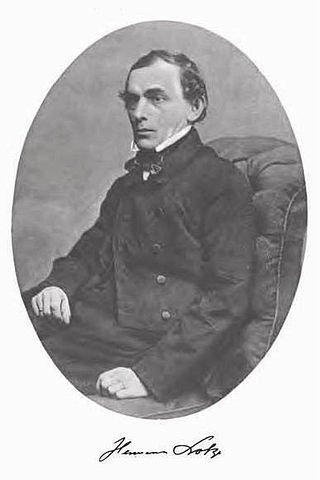
Rudolf Hermann Lotze was a German philosopher and logician. He also had a medical degree and was well versed in biology. He argued that if the physical world is governed by mechanical laws and relations, then developments in the universe could be explained as the functioning of a world mind. His medical studies were pioneering works in scientific psychology.

Hermann Minkowski was a mathematician and professor at the University of Königsberg, the University of Zürich, and the University of Göttingen, described variously as German, Polish, or Lithuanian-German, or Russian. He created and developed the geometry of numbers and elements of convex geometry, and used geometrical methods to solve problems in number theory, mathematical physics, and the theory of relativity.

Friedrich Gottlieb Klopstock was a German poet. His best known works are the epic poem Der Messias and the poem Die Auferstehung, with the latter set to text in the finale of Gustav Mahler's Symphony No. 2. One of his major contributions to German literature was to open it up to exploration outside of French models.
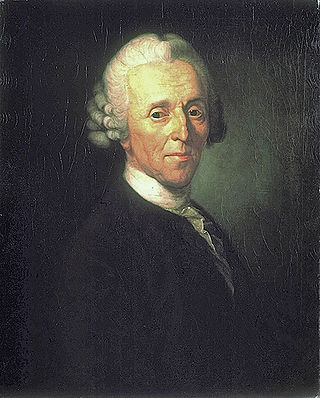
Christian Fürchtegott Gellert was a German poet, one of the forerunners of the golden age of German literature that was ushered in by Lessing.

Karl Georg Büchner was a German dramatist and writer of poetry and prose, considered part of the Young Germany movement. He was also a revolutionary and the brother of physician and philosopher Ludwig Büchner. His literary achievements, though few in number, are generally held in great esteem in Germany and it is widely believed that, had it not been for his early death, he might have joined such central German literary figures as Johann Wolfgang von Goethe and Friedrich Schiller at the summit of their profession.

Tinsel is a type of decorative material that mimics the effect of ice, consisting of thin strips of sparkling material attached to a thread. When in long narrow strips not attached to thread, it is called "lametta", and emulates icicles. It was originally a metallic garland for Christmas decoration. The modern production of tinsel typically involves plastic, and is used particularly to decorate Christmas trees. It may be hung from ceilings or wrapped around statues, lampposts, and so on. Modern tinsel was invented in Nuremberg, Germany, in 1610, and was originally made of shredded silver.
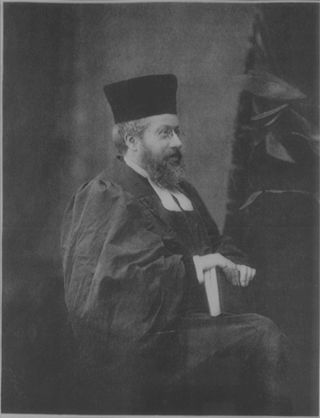
Hermann Adler HaKohen CVO was the Chief Rabbi of the British Empire from 1891 to 1911. The son of Nathan Marcus Adler, the 1911 Encyclopædia Britannica writes that he "raised the position [of Chief Rabbi] to one of much dignity and importance."

Adam Gottlieb Hermann Muthesius, known as Hermann Muthesius, was a German architect, author and diplomat, perhaps best known for promoting many of the ideas of the English Arts and Crafts movement within Germany and for his subsequent influence on early pioneers of German architectural modernism such as the Bauhaus.
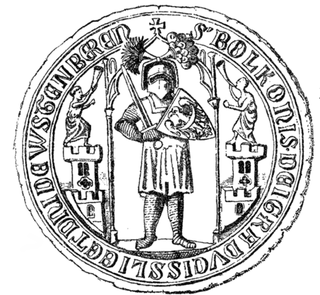
Bolko (Bolesław) I the Strict, also known as Bolko (Bolesław) of Jawor, was a Duke of Lwówek (Löwenberg) 1278–81 and Jawor (Jauer) after 1278, sole Duke of Lwówek after 1286, Duke of Świdnica-Ziębice from 1291.
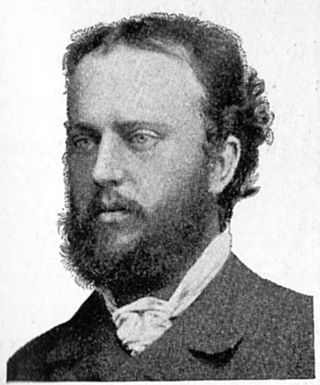
Ferdinand Avenarius was a German lyric poet, a leading representative of the culture reform movement of his time and the first popularizer of Sylt.

Mutilation was a common method of punishment for criminals in the Byzantine Empire, but it also had a role in the empire's political life. By blinding a rival, one would not only restrict his mobility but also make it almost impossible for him to lead an army into battle, then an important part of taking control of the empire. Castration was also used to eliminate potential opponents. In the Byzantine Empire, for a man to be castrated meant that he was no longer a man—half-dead, "life that was half death". Castration also eliminated any chance of heirs being born to threaten either the emperor's or the emperor's children's place at the throne. Other mutilations were the severing of the nose (rhinotomy), or the amputating of limbs.
"Der Taucher" is a ballad by Friedrich Schiller, written in 1797, the year of his friendly ballad competition with Goethe.
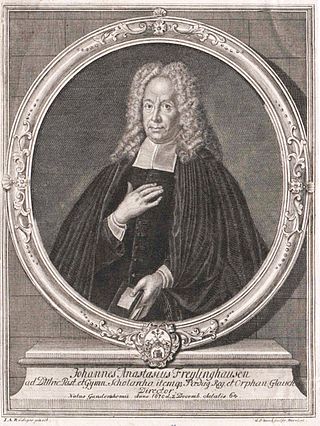
Johann Anastasius Freylinghausen was a theologian of the pietist Halle School and a scholar and follower of August Hermann Francke. He was the second director of the Franckeschen Stiftungen, a collection of schools for orphans.
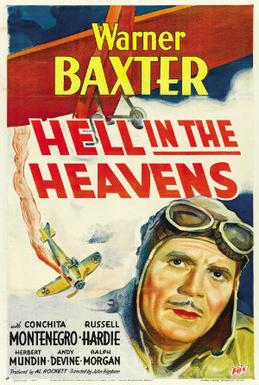
Hell in the Heavens is a 1934 American aviation drama film directed by John G. Blystone and written by Byron Morgan, Ted Parsons and Jack Yellen based on the stage play Der Flieger by Hermann Roßmann. The film stars Warner Baxter, Conchita Montenegro, Russell Hardie, Herbert Mundin, Andy Devine and William Stelling. It was released on November 9, 1934 by Fox Film Corporation.
References
- ↑ Garland, Henry; Garland, Mary, eds. (1997). "Fressant, Hermann". The Oxford Companion to German Literature (3rd ed.). Oxford University Press. ISBN 9780198158967 – via Oxford Reference.